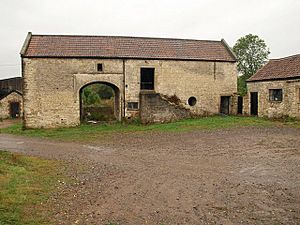Joan Beauchamp facts for kids
Quick facts for kids
Constance 'Joan' Beauchamp
|
|
|---|---|
| Born | 1 November 1890 Midsomer Norton, England
|
| Died | 1964 (aged 73–74) |
| Nationality | British |
| Citizenship | United Kingdom |
| Known for | Suffragette activism. Co-founder of the Communist Party of Great Britain (CPGB). One of University of London's first female graduates. |
|
Notable work
|
Agriculture in Soviet Russia (1931). Women who Work (1937). Soviet Russia, A syllabus for study courses (1943) |
| Spouse(s) | Harry Thompson |
| Children | Robin.(son) Brian.(son) |
| Relatives | Frank Beauchamp. Kay Beauchamp |
Constance 'Joan' Beauchamp (born November 1, 1890 – died 1964) was a very important British woman. She strongly campaigned against World War I. She was also a suffragette, which means she fought for women's right to vote. Joan Beauchamp helped start the Communist Party of Great Britain.
Contents
Growing Up in Somerset
Joan Beauchamp was born in 1890. Her family lived on a farm in Welton, Midsomer Norton, in Somerset, England. She had a sister named Kay Beauchamp. Kay also helped found the Communist Party of Great Britain.
Their family was well-known in the Somerset coalfield area. Joan's father was a cousin of Sir Frank Beauchamp. Sir Frank and Louis Beauchamp owned coalmines nearby. Joan's mother passed away in 1904 when Joan was fourteen years old.
Fighting for Change
Standing Up Against War
During the First World War, Joan Beauchamp became very active. She joined the No Conscription Fellowship (NCF). This group helped people who refused to join the military. They gave advice to about 16,000 pacifists and socialists. These people did not want to fight in the war. In 1920, Joan was sent to prison for ten days. This was because of her anti-war activities.
A Founder of the Communist Party
Joan Beauchamp was a founder of the Communist Party of Great Britain. She remained a member throughout her life. She also worked with Sylvia Pankhurst, another famous suffragette. Joan was known as a very strong supporter of the suffragette movement. She believed women should have the right to vote.
Views on Soviet Agriculture
Joan Beauchamp supported how the Soviet Union organized farming. This was called collectivization of agriculture. She wrote a book about it called Agriculture in Soviet Russia (1931). She also wrote an article after visiting Ukraine in 1933. In her article, she said she did not see any signs of famine. She wrote that people themselves did not use the word 'famine'.
Education and Family Life
Joan Beauchamp was one of the first women to graduate from the University of London. She married Harry Thompson. He was a lawyer and had worked with her in the NCF. They had two sons, Robin (born 1924) and Brian. Both of their sons grew up to become important lawyers for trade unions.
Later Years
Joan Beauchamp later worked as a journalist in London. During the Second World War, she was badly hurt. This happened because of a German flying bomb.
She also helped her husband with his law firm. Their firm only worked for trade unions and their members. Joan's husband, Harry Thompson, passed away in 1947. Joan Beauchamp died in 1964.
Books by Joan Beauchamp
- Poems of revolt : a twentieth century anthology chosen by Joan Beauchamp (1924)
- Agriculture in Soviet Russia (1931)
- Women who Work (1937)
- Soviet Russia, A syllabus for study courses (1943)
- Scientific socialism
 | Sharif Bey |
 | Hale Woodruff |
 | Richmond Barthé |
 | Purvis Young |


